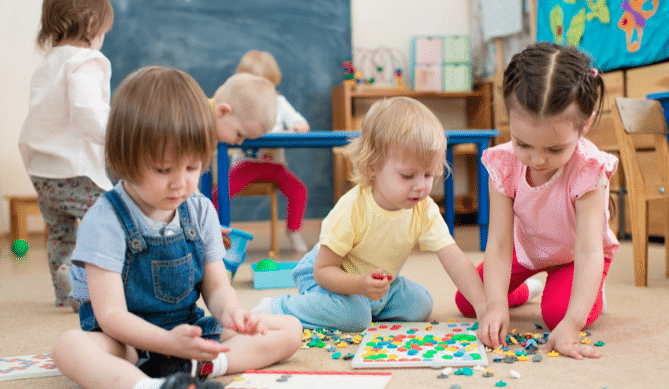In the U.S, around 59% of four-year-olds attend preschool along with 40% of three-year-olds which proves it’s a popular option for families.
Preschool programs are a life-saver for parents because children get a great education and they can socialize with classmates. Perhaps you’re planning to send your little one to preschool but you’re unfamiliar with the advantages.
Sounds like you? Don’t worry, we’ve got you covered. Here are the main benefits of preschool.
1. Improves Self-Esteem
One of the main benefits of nursery and preschool education is it improves children’s self-esteem. This is because teachers shower each child with positive reinforcement, as they learn how to write their name or draw a new shape.
Your little one will carry this throughout their lives and it will give them the confidence to discover new subjects. Plus, it stokes children’s curiosity as teachers use their class’s interests as inspiration for new activities.
For instance, spotting an unfamiliar bird in the playground can turn into an informative class about naming different animals.
2. Better Attention Span
Unfamiliar with the benefits of 3 year old preschool?
Know that enrolling in preschool helps develop your child’s attention span. It’s no surprise that concentration is key in their later years, so it’s wise to start them early. Early education is a fantastic way to teach little ones the distinction between work and play, so they know when it’s time to focus, a crucial skill in our digital age.
If you’re interested, then check out a fantastic preschool at https://www.principledacademy.org.
3. Promotes Healthy Living
One of the top benefits of preschool for toddlers is it encourages them to stay active and eat healthy. Over 14 million children and adolescents are obese because they’re exposed to poor diets and don’t get regular exercise.
But at preschool, teachers incorporate physical activity into classes so little ones stay active. Most institutions also have an outdoor area where kids can play tag with one another and experiment with different sports.
And when you encourage exercise, then promoting a healthy diet becomes easier, whether it’s sneaking in broccoli at dinner or swapping out potato chips for carrots.
4. Boosts Creativity
Many parents believe the main benefit of afternoon preschool is how teachers nurture children’s creativity.
Art projects are crucial so kids finger paint, do arts and crafts, and learn how to draw. Preschools also understand the importance of music, so don’t be surprised when your little one comes home and teaches you a new song or dance.
Aside from keeping your kid engaged, music improves children’s brain and body coordination, a key aspect of child development. Plus, preschool is the perfect environment for your child to cultivate a healthy imagination.
Play areas are packed with props, costumes, and even household items, so the class can bond with one another while expanding their imagination.
5. Encourages Social Interaction
Children need to learn social skills early on, and there’s no better place than at preschool. There will always be teachable moments such as when kids argue. This is the best way to teach them about controlling their frustration and treating one another with kindness.
Further, the classroom is structured to encourage social interaction which they wouldn’t get staying at home. Little ones also develop their patience skills, learn to wait for their turn, and understand the importance of sharing their belongings with others.
6. Promotes Language and Math Skills
Another one of the most important benefits of nursery and preschool is how it gives children a headstart with their language skills and math.
The only way to strengthen children’s cognitive skills is by offering them challenging questions and providing problem-solving exercises. For instance, teachers give little ones reading instructions, teach the different types of coins, and how to assemble basic toys.
As a result, children develop an enthusiasm for reading, discovery, and deepening their knowledge.
7. Great Preparation for School
Every parent dreads their child’s first day at school, so preschool is a good way to ease into it.
During preschool, kids learn how to take care of themselves and help any classmates who are struggling. Teachers use real-life situations like asking kids to hand out stationarity or feeding the classroom pet.
Going to preschool also teaches little ones resilience because they face challenging problems, whether it’s losing a game or struggling with a math question. Although it’s initially a shock, children build coping strategies so they can withstand larger issues in life.
Preschool preparation is key because, throughout their education, children learn from their peers, so there’s no better time to start. Further, most classes have kids from different religions, ethnicity, and socio-economic backgrounds, so your little one can befriend a diverse group of classmates.
Not sure how to find the relevant preschool for your little one?
As you browse the curriculum, make sure children have the chance to learn art, music, reading, and math at a bare minimum. It’s also wise to visit in person, so you can meet teachers and ask them more about the preschool and what it offers.
Benefits of Preschool
Hopefully, after reading this article, you now know the benefits of preschool.
Preschool improves children’s self-esteem, concentration, and introduces them to the wonders of learning. It’s also the best place to meet new friends, boost their creativity skills, and improve their attention span. What’s not to love?
Did you find this article helpful? Great! Then check out our posts on everything from Family to Fitness.











